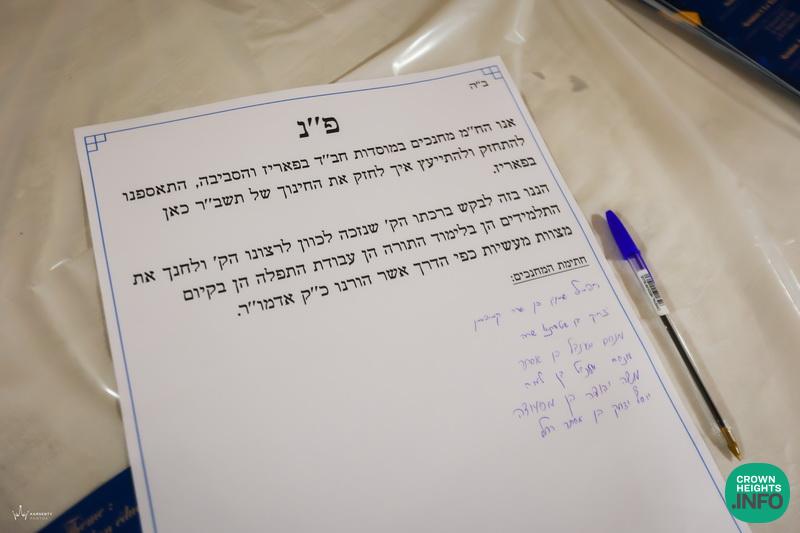
Weekly Story: Writing A Pa”n
by Rabbi Sholom DovBer Avtzon
In this week’s post, my aim is not to relate a story that hopefully will inspire the readers, but to create a thoughtful discussion. As always, your feedback is greatly appreciated.
Sitting at the Ohel and thinking what I should write in my pa”n, the following thought came up.
In Sefer Hatoldos on the Frierdiker Rebbe, there is the following story.
Once, when his father the Rebbe Rashab sent him to Petersburg on a mission concerning communal matters, he was there for a while. The Frierdiker Rebbe returned to Lubavitch before Shabbos and gave his father a detailed report.
The Rebbe Rashab then told him that on Sunday he should be ready to go to the Ohel. On Sunday morning, the Rebbe Rashab gave him duplicate panim. Everything was exactly the same, besides the top line. One was addressed to his father (the Frierdiker Rebbe’s grandfather) the Rebbe Maharash, and the other was addressed to the Rebbe the Tzemach Tzedek to be read at his ohel. Additionally, there were two sets: one duplicate set was on behalf of the Rebbe Rashab and one set was on behalf of the Frierdiker Rebbe that he should succeed in the mission his father entrusted him to accomplish.
As is known, the ohel of the Rebbe Maharash is adjacent to the ohel of his father, the Rebbe the Tzemach Tzedek. Yet, the Rebbe Rashab wrote the entire pa”n on his behalf as well as the one on his son’s behalf twice, to be read by each Rebbe individually.
After thinking it over, I decided that it is preferable for me also to write two separate panim than one.
When a person writes one pa”n, there is the question to whom it should be addressed to. While the vast majority of us never saw the Frierdiker Rebbe or lived during his lifetime, it is only natural for us to address it first to our Rebbe. However, the thought that always nagged me was, would the Rebbe be happy that I am giving him preference over his father-in-law, the Frierdiker Rebbe?
Furthermore, some have told me that they only address it to our Rebbe. The difficulty I have with that is much stronger: is it proper and would the Rebbe be pleased that when we are standing in front of the Ohel of his father-in-law, the Frierdiker Rebbe, we ignore him?
I once heard from Rabbi Krinsky that in the year his father was niftar, once when he drove the Rebbe to the Ohel, the Rebbe asked him if he went to his father’s kever.
Rabbi Krinsky was shocked and replied, “I was told that during the first year one should not go to the niftar.”
“Discuss it with a Rov,” was the Rebbe’s answer.
Hearing this conversation, the Rov informed him, “The Rebbe was saying that during the year one is not supposed to ask the one who passed away to daven on their behalf. So therefore, don’t go specifically to the cemetery to visit them. But if you are by the cemetery for a different purpose, now the question the Rebbe asked is, is it respectful to be in proximity of your father and ignore him by not visiting him? Evidently the Rebbe feels that is improper. Therefore, visit, but don’t ask him to intercede on your family’s behalf.
So not to address the pa”n to the Frierdiker Rebbe is in my opinion out of the question.
Therefore, I wrote two panim.
Discuss this with your Rov and or mashpia and may we speedily merit the end of golus and darkness with the coming of Moshiach speedily in our days.
Rabbi Avtzon is a veteran mechanech and the author of numerous books on the Rebbeim and their Chassidim. He can be contacted at avtzonbooks@gmail.com














Mushkie
Ww write a pa”an to the Rebbe.
Do we have one Rebbe or two Rebbes (or seven or 9 Rebbes)?
If the present and previous rebbe are “combined” as one soul, then if we write a pa”an to the Rebbe, it includes the Previous Rebbe.
Can a person have two heads?! REBBE is ראש בני ישראל, only one head!
Can bnei Yisroel have two kings at once? A Rebbe is a מלך.
Even if Rebbe called Previous -continued-
Mushkie
Even if Rebbe called Previous Rebbe “nesi doreinu”, that is because to Rebbe, the Previous Rebbe was HIS Rebbe but we have only one Rebbe.
Although in Maaneh Loshon we address both Rebbes, but who is OUR Rebbe?! Who do we give a pa”an to?!
I can’t believe this is even a question and a topic open for discussion!!
Mushkie
Another approach:
The relationship of a son to his father and grandfather, or a student to his teacher and teacher’s teacher.
Who does the son or student greet first – his father/teacher or his father’s father and teacher’s teacher?!
Who’s lost object has priority to be returned? Who’s life has priority to be saved?
Yanky
A new king is annointed after the passing of the previous. The Rebbe said that previous Rebbe never passed. Therefore The previous Rebbe IS “NESSI DORAYNU”, but…Rebbe is Nessi Doraynu. Therefore we MUST combine them and write pa”an to both. Two sparks from same flame.
Nach Lady
Yanky, a king can be anointed during lifetime of another king. Technically there CAN be 2 kings at one time. Adoniyahu was anointed king during life of Dovid but surrendered kingship to Shlomo. Does each of then have the full Din of melech? I’m not a rabbi to answer such shaylos. Point is, maybe just as 2 kings at same time, so too, 2 Rebbes at one time. (And Talmud mentions person with 2 heads!)
Chosid
Is it possible to only be mekushar to the Rebbe and not feel connected to the previous Rabbeim? Historically there were great chassidim if some Rebbes that after the passing of their Rebbe, broke off to other chassidis, even setting up their own court!
A related question
A related question:
Whom do I visit first at the cemetery, the Rebbe’s resting place or a relative’s place? On the one hand, the visit to Rebbe should be first, to honor him first (just as Kohen gets first aliyah). But on other hand maybe better to appear before Rebbe after getting zchus of Kibud Av v’Eim, and praying at Rebbe for the relatives you just visited. Which is best?
Genug shoin
Mushkie, you have strong opinions but lack humility of accepting the views of rabbis that know much more than thou. Kabolos ol and bitul would look good on you. Acting like a know-it-all does not suit you. Genuine shoin.
Tomim
I like these mini-farbrengens of comments, but there are two things missing: 1. Someone to lead the farbrengen of comments (Hint – Rabbi Avtzon, lead the way!). 2. To say l’chaim and sing a niggun (because intellectual thoughts need an emotional outlet of a niggun, and brought down l’ma’aseh with a l’chaim).